Key takeaways:
- Content monetization involves generating revenue through various methods like ads, subscriptions, and affiliate marketing while building relationships with the audience.
- Understanding audience needs and preferences is crucial for successful monetization strategies, which can include diversifying revenue streams through courses or premium content.
- Maintaining authenticity is vital in sponsored content and affiliate marketing to ensure trust with the audience.
- Measuring success goes beyond revenue, incorporating engagement metrics and qualitative feedback to gauge the impact on the audience.
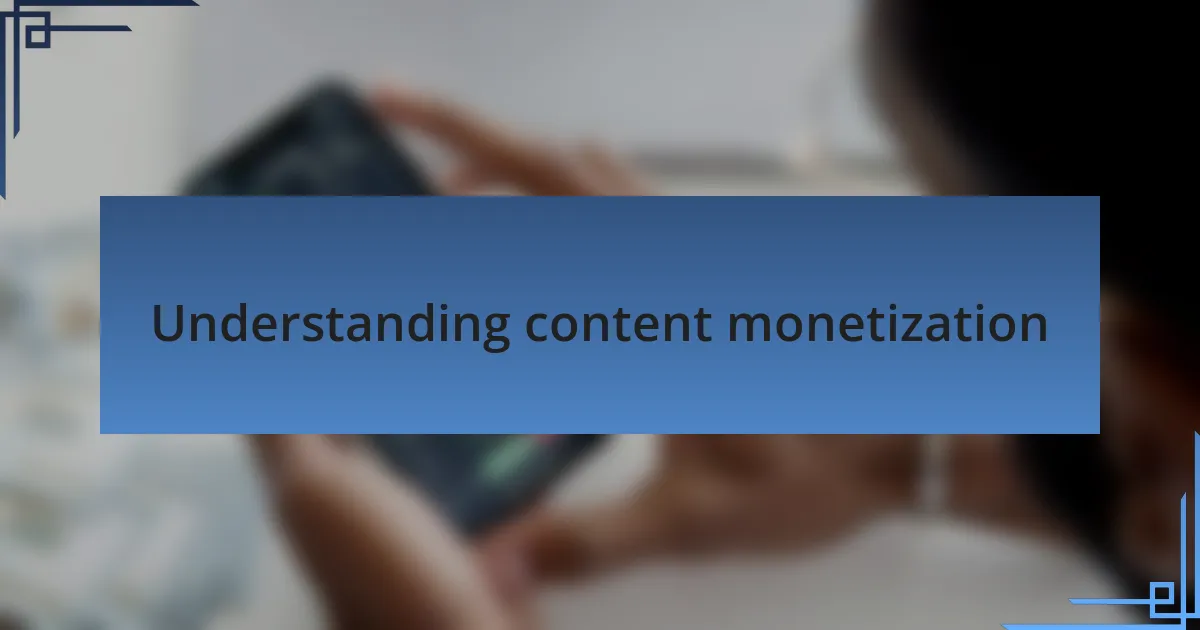
Understanding content monetization
Content monetization is the process of earning revenue from the content you create, whether that’s written articles, videos, or podcasts. I remember when I first realized the potential of my own blog; seeing those initial ads and affiliate links start to generate income felt like magic. Have you ever thought about how much effort goes into creating content and how rewarding it is when it starts paying off?
There are numerous avenues for monetization, such as ads, subscription models, and sponsored content. I’ve experimented with different strategies over the years, finding that each platform has its unique audience and preferences. It led me to wonder: what kind of content resonates most with your audience? Understanding their interests is key to choosing the right monetization approach.
Engaging your audience through high-quality content isn’t just about making money; it’s about building relationships. I recall a time when a reader reached out after experiencing the value from one of my articles – that connection was worth more than any ad revenue. This highlights the dual purpose of content monetization: financial gain paired with genuine interaction. How do we balance these two elements in our strategies?
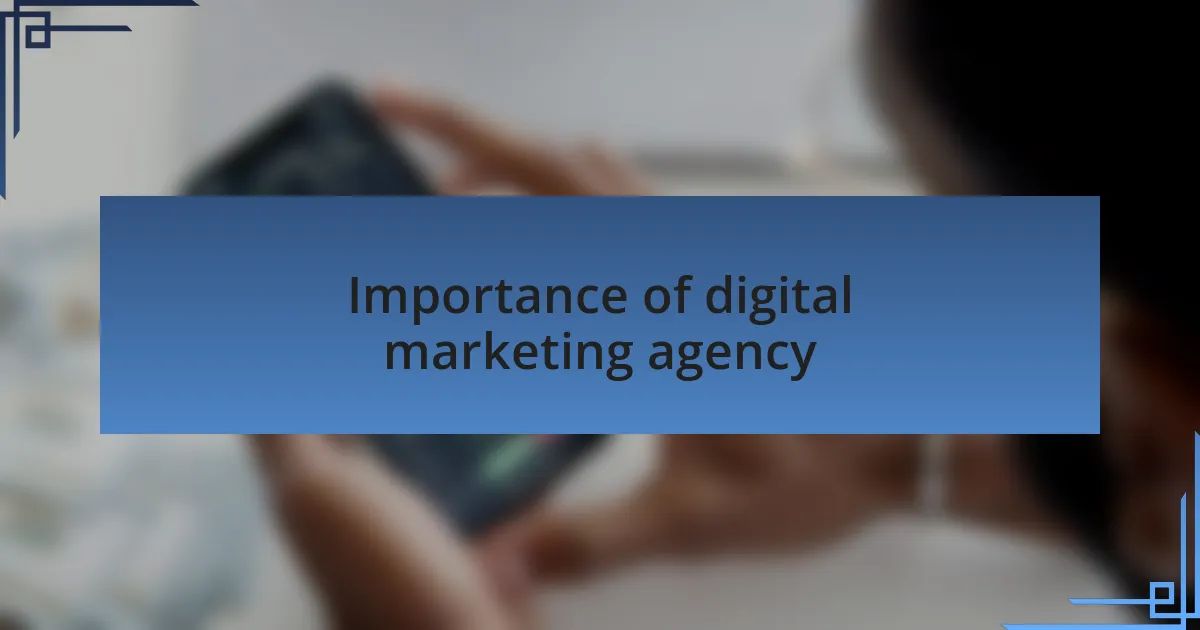
Importance of digital marketing agency
A digital marketing agency plays a crucial role in navigating the complex online landscape. From my experience, having a dedicated team means you’re not just another voice in a crowded marketplace. I remember a project where our targeted strategies transformed a small brand into a recognizable name. Can you imagine the impact of having professionals who know how to elevate your business visibility?
In a world where consumer behavior is constantly shifting, these agencies stay ahead of trends and algorithms. I’ve often marveled at how quickly they adapt. Once, I was amazed by how a well-timed social media campaign turned around a product’s sales overnight. Have you considered how a missed opportunity in the digital realm could affect your bottom line?
Moreover, a digital marketing agency streamlines your efforts by focusing on your core business objectives. It allows entrepreneurs like me to channel energy into what we love while experts handle the digital intricacies. I’ve found that this collaboration leads to better results than going it alone. Why strain yourself with tasks outside your expertise when you can leverage specialized skills?
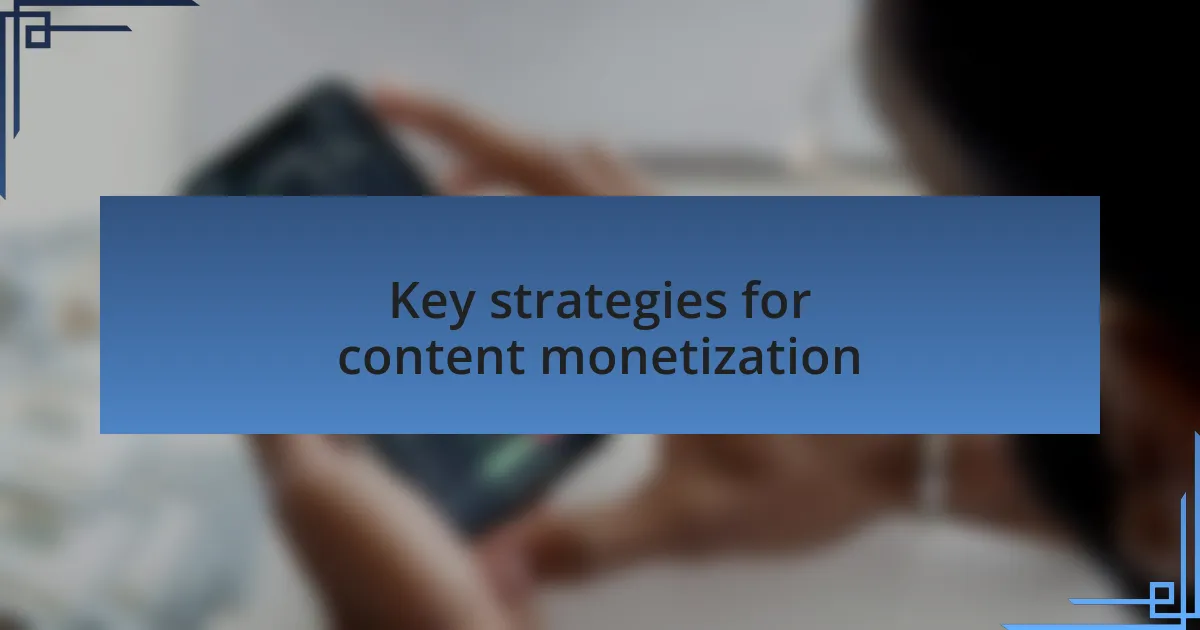
Key strategies for content monetization
A fundamental strategy for content monetization is understanding your audience’s needs and preferences. I recall a time when I surveyed my audience for feedback, which helped me identify content topics that truly resonated. This insight not only increased engagement but also opened the door to targeted affiliate partnerships that felt natural and aligned with my brand.
Diversifying revenue streams is another effective approach. During one of my projects, I experimented with incorporating online courses and webinars alongside my usual blog posts. The result was shocking—I not only reached a broader audience but also created a sustainable income while sharing my knowledge. Have you thought about how you could transform your expertise into a revenue-generating product?
Finally, leveraging platforms for direct support from your audience can be a game-changer. I remember setting up a Patreon account to offer exclusive content to my loyal followers. The emotional connection that developed was tangible, and it transformed my relationship with them. How might creating a closer bond with your audience change your monetization strategy?
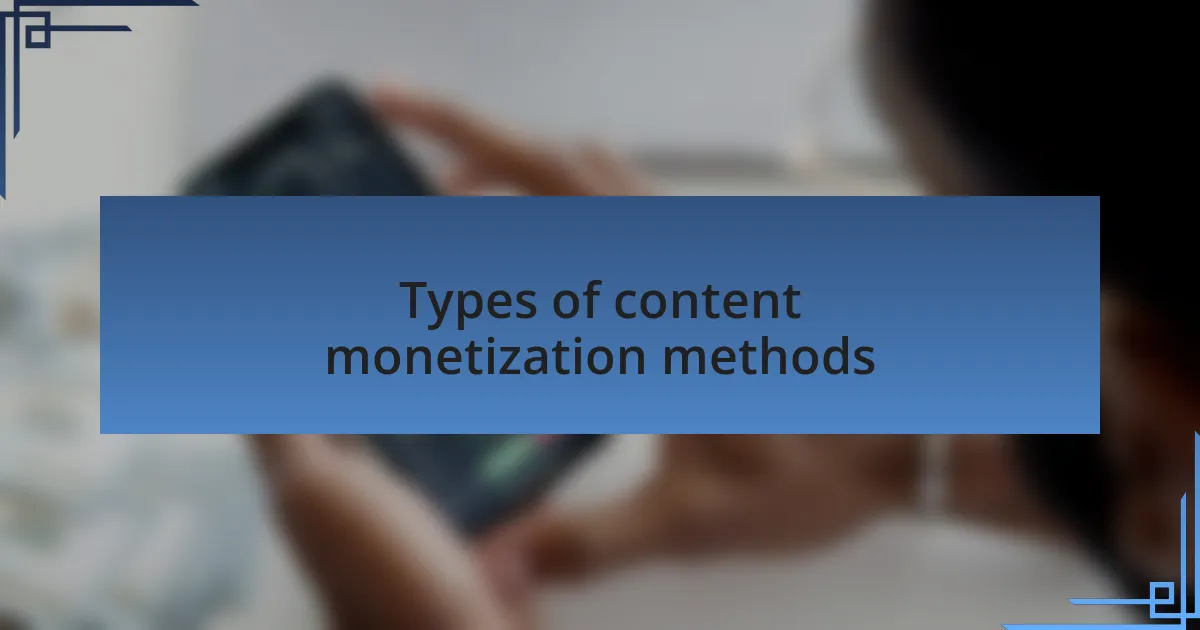
Types of content monetization methods
When it comes to content monetization methods, affiliate marketing stands out as a popular choice. I remember the thrill of landing my first affiliate deal; it felt like validation of my content’s value. By recommending products I genuinely love, I’ve not only made a bit of money but also enhanced my content’s credibility. Isn’t it great when monetization comes from something you believe in?
Another effective method is subscription-based content. I decided to offer premium articles to my most engaged readers, who were eager for deeper insights. The satisfaction of providing exclusive value struck a chord, and knowing there was a direct reward for my efforts made the experience even more fulfilling. Have you considered how turning your knowledge into exclusive content could build a loyal community willing to pay for it?
Lastly, sponsored content can be a lucrative avenue. I still vividly recall the first time a brand approached me for a sponsored post. It felt thrilling to collaborate with companies that aligned with my message. However, I learned that maintaining authenticity is crucial—my audience trusts my recommendations, and it’s essential to uphold that trust. How do you balance monetization with authenticity in your content journey?
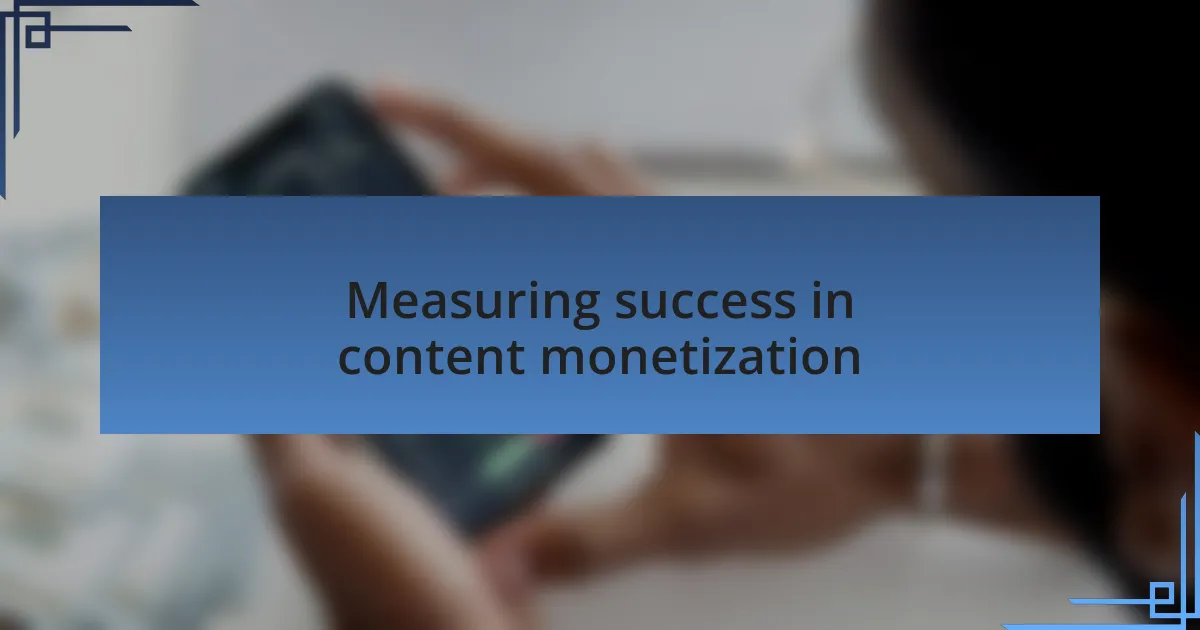
Measuring success in content monetization
To effectively measure success in content monetization, I often turn to key performance indicators (KPIs) that reveal the true impact of my efforts. For instance, tracking metrics like conversion rates on affiliate links or the growth of paying subscribers provides a clearer picture of what resonates with my audience. Have you found any specific metrics that truly guide your understanding of success?
In my experience, engagement metrics, such as time spent on content or social shares, also play a vital role. I remember analyzing a piece that went viral; the interactions showed me that I had struck a chord with my audience. Beyond just revenue, these insights help gauge how well my content connects emotionally, which is invaluable for future strategies. What metrics have surprised you with their insights?
Finally, don’t overlook qualitative feedback from your audience. I once received a heartfelt email from a reader who shared how my subscription content changed their perspective on a topic. That kind of feedback is priceless! It reminds me that success isn’t solely defined by revenue but also by the impact I have on my community. How often do you engage with your audience to gather this kind of feedback?

My personal experiences with monetization
When I ventured into content monetization, my first significant leap was incorporating affiliate marketing. I vividly recall the excitement of seeing my first click-through from a product recommendation. It was a rush that taught me the power of aligning my content with my audience’s interests. Have you felt that moment of validation when a piece of content resonates so well that it leads to real income?
I also explored the world of online courses, something that evolved organically from my blog. The moment I launched my first course, I was flooded with feedback from eager learners. One particular email still sticks with me; a student explained how the course transformed their approach to digital marketing. That emotional connection fueled my desire to create even more engaging content. How do you ensure your offerings resonate deeply with your audience?
Additionally, I’ve dabbled in ad placements, but the experience was mixed. While some posts generated decent revenue, others felt like a distraction. There was a point where I prioritized user experience over quick income, and my audience responded positively. It’s vital to strike that balance. Have you ever faced a choice between monetization and maintaining the integrity of your content?
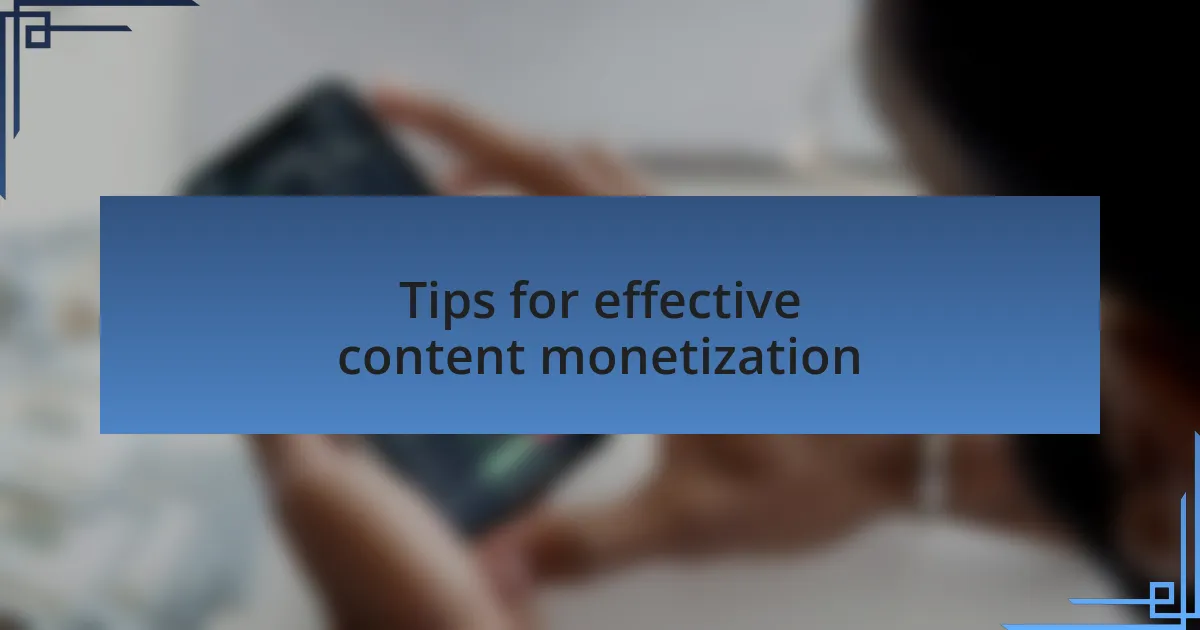
Tips for effective content monetization
When considering effective content monetization, I learned that knowing your audience is crucial. I remember launching a series of blog posts that barely scratched the surface of my readers’ interests. The moment I shifted my focus to topics they were genuinely curious about, engagement soared. Have you ever noticed how a small tweak in your content can lead to significant changes in audience interaction?
Diversifying your revenue streams has also been a lesson I’ve embraced. I ventured into podcasting after realizing my audience loved consuming content in different formats. The feedback was overwhelmingly positive, as listeners shared how much they enjoyed the on-the-go insights. Combining various monetization strategies can create a more stable income. What have you done to branch out and cater to different preferences within your audience?
Lastly, creating value through premium content has been a game-changer. I once developed a membership area on my site that offered exclusive resources and deeper insights. The sense of community that flourished was beyond what I expected, and it reinforced my belief in delivering quality over quantity. Have you ever thought about how exclusive content can foster deeper connections with your audience?